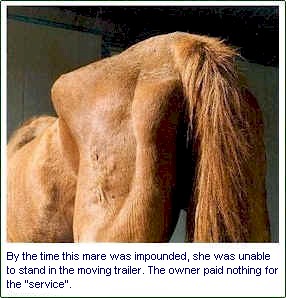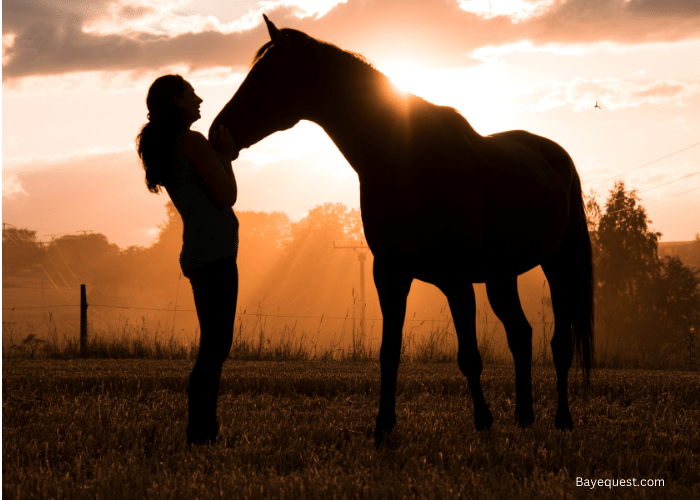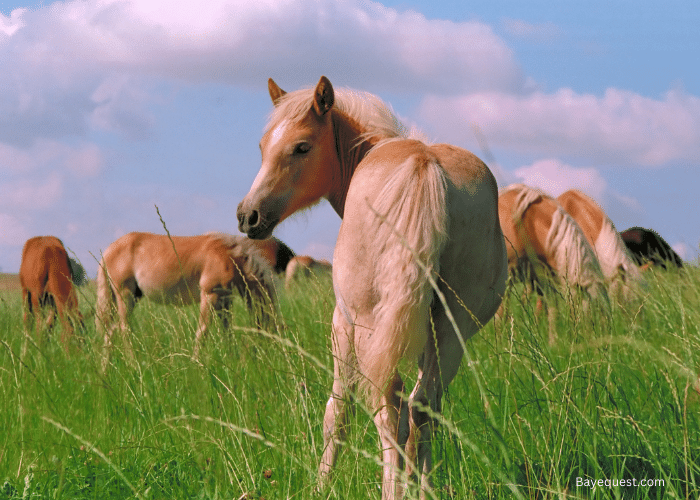The sight of it hits you like a ton of bricks. A starving horse. Your reaction is actually visceral, and once you begin to recover from the initial shock, you are eventually moved to disbelief, then to anger. You don’t have to be a horseperson to feel these things, you just have to be human. Most of us tend to shake it off and wonder why someone hasn’t done something. But for some of us, the overwhelming and inescapable call to action finally supersedes our emotions and we suddenly find ourselves on a mission.
What can you do to effectively help animals stuck in perilous conditions?
You may think the answer is a no-brainer — simply call the local animal control or humane society. They come to the rescue and everyone lives happily ever after, right? Not quite. In fact, it’s rarely, if ever, that simple. To be an effective advocate for animals at risk, you must be prepared to commit a potentially substantial amount of time and effort toward achieving some sort of resolution to the suffering.
Background on some causes of neglect.
I advise you not to approach an owner, even if you know them. It is helpful to understand that people generally allow animals to decline and languish for two basic reasons, i.e., they do it out of ignorance, or because of financial hardship, or sometimes both.
At worst, any intervention on your part may evoke hostility, possibly putting you into a volatile and dangerous situation. At best, your interference may elicit strong feelings of shame and embarrassment, putting the owner on the defensive. Ultimately, such confrontations are generally unproductive, potentially explosive and, frankly, not worth the risk.
Ignorance which allows such blatant cruelty can be beyond your comprehension, but you must try to understand if you are to begin to deal with its consequences effectively. Hard as it is to imagine, the ignorant owner just doesn’t see what you see, nor do they have the ability to recognize for instance, the horses down the road with their glossy coats and rounded muscles look different from those they keep. The ignorant owner doesn’t always live on Tobacco Road either; many a rescue has been conducted in the priciest neighborhoods. Ignorance transcends socioeconomic status.
Neglect resulting from financial hardship can be exceedingly difficult to deal with for a number of reasons. Neglected, starving horses are a (sometimes) highly visible symptom of an extremely sensitive, intensely private malady. Over time, pride evolves into denial, then spirals into neglect, which is generally succeeded and compounded by embarrassment, further denial, and shame. An emotionally charged environment like this can and does create unique legal barriers to providing relief for the animal, which; in the eyes of the law, is private property. Sadly, the thorny issue of private property can become an insurmountable barrier to critical rescue efforts.
Occasionally animals fall victim to willful, malicious cruelty or depravity, but, thankfully, these instances are far less likely. The link between such behavior and the potential for ensuing criminal behavior is so demonstrably strong that the state of California has mandated rehabilitation for convicted offenders. If you observe such behavior, do not intervene, but do call the appropriate law enforcement agency.
Where to begin.
For starters, assess the situation as best you can without trespassing. Note the condition of the animal, the environment in which it is kept, if there is food, water, and shelter, the address, and any other pertinent information. No matter how bad it is, even if there is no water or shelter and it’s 100, DO NOT attempt to help the animal yourself. This can work against you and the animal. First, no matter how noble your intentions, you are trespassing onto private property. Second, if, for instance, you give the animal water, when the humane society investigates and finds it has water (even if it knows you gave it to the animal), you’ve inadvertently sabotaged the animal and your efforts.
Once you’ve made the decision to get involved, be prepared to commit some time and energy to the task. Get a notebook, a pen, and call the local animal control, humane society, or other governing agency. If at all possible, enlist others to call and register their concerns. Don’t underestimate the strength of allies — they are powerful tools in establishing and maintaining credibility and helping to motivate agencies to action.
Befriend animal control/humane officers assigned to the case and keep in touch with them. They are important resources and can provide, among other things, insight into protocol. They can advise you regarding the tools at your disposal and, perhaps most importantly, they can tell you what their limitations are.
At the risk of insulting you, I advise you to be professional, courteous, patient and, above all, be persistent. Dealing with county or state agencies charged with the welfare of animals can be an enormously frustrating process, especially when you are emotionally invested and can see that time is of the essence. Take detailed notes of your conversations, the names of people with whom you spoke, dates, and times. Get them to open a file, investigate, and monitor the situation.
Follow-up is essential. You’d be amazed at how common it is for a case to fall through the cracks. For instance, my efforts to aid a starving horse were significantly delayed because Animal Control saw that County Humane had an open file so it closed its files; trouble is, County Humane saw Animal Control had an open file and closed its files too. It happens, be vigilant.
In the meantime, familiarize yourself with local ordinances and state laws relating to animal abuse and neglect. Ask for copies from agencies or search the Internet. In California, go to www.leginfo.ca.gov to find the California Penal Code. The animal welfare provisions can be found at 597. Be prepared to accept the ambiguous definitions of the law; the nebulous language makes it difficult to prosecute even the most heinous offender. For example, CA Penal Code 597(b) states, “…or in any manner abuses any animal or fails to provide the animal with proper food, drink, or shelter or protection from the weather…” “Proper food, drink, or shelter” are all left to interpretation. You’d be amazed how this language can hamstring efforts to rescue an animal.
What I have found is animal control officers are reluctant, and often unwilling, to take even the most egregious case to the District Attorney because they know it cannot be prosecuted (see photograph). Officials can be extremely reluctant to intervene because horses are private property, residing on private property. Such private property issues and the legal ambiguities combine to make prosecution extremely difficult, if not impossible.
News media are quick to cover stories showing animal control officers impounding neglected and starving horses. We’ve all seen these incidents and even taken some comfort in the knowledge our tax dollars are working to protect such animals in need. However, the astute viewer will note (or the media may neglect to report) that one or more horses had died prior to or during the impoundment procedure. This is a prosecutable case. Anything less is legally problematic.
Alternatives.
You may reach a point where the bureaucratic inertia makes it clear there is no measurable relief in sight for the animal you are trying to help. There are a number of rescue organizations and volunteer groups willing to get involved. Some work with animal control officers, some contact owners, and some provide funding for rescue efforts.
Many of these organizations can be found through this (BAEN) website. However, there are others which are lesser known and may not be readily found through a word search on the Internet but are worthy of note.
In 1996, Rio Vista Products, Inc., president, James B. Towle, established The Rio Vista Fund to help rescue and rehabilitate abused and mistreated horses and dogs. Rio Vista sets aside a certain portion of each sale of Rio Vista products to finance organizations working toward this goal. Specifically, the funds are issued for the rehabilitation of a particular animal, with the aim to establish a relationship with a particular animal, not for the agency general fund.
H.O.R.S.E. (Helping Our Rescue Save Equines) is a tax-exempt humane corporation based in Ventura County. They recently opened a new location in upstate New York. H.O.R.S.E. is active in many areas that encompass horse interests and fosters the humane ethic and philosophy through education, legislative, investigative, and legal activities. Chris and Mike Dodge started H.O.R.S.E. in 1993 and incorporated in 1997. They’ve adopted out over 150 horses and provide sanctuary for those deemed unadoptable. Their website is a goldmine of information and resources for those in need.
Go to www.geocities.com/Heartland/Valley/2887/Equine_Rescues.html for a comprehensive map detailing animal rescue organizations for any location in North America including Alaska.
The UC Davis Center for Equine Health is a tremendous resource for horse-related information. In 1992, the School of Veterinary Medicine was the first veterinary school in the U. S. to develop a faculty position addressing animal welfare issues for agricultural animals.
The July, 1998 issue of The HORSEREPORT is dedicated to UC’s ongoing research relating to rehabilitating the starved horse. As part of this study, UC has developed a body condition scoring system to aid the assessment and communication of a horse’s condition. Condition is scored from (1) Extremely emaciated to (9) Obese. This scoring method will aid you in determining the condition of a particular horse and help you to communicate it in a professional, coherent manner.
The media can be a useful ally in your attempts to rescue an animal. Contact the local “troubleshooter”, “human interest”, or “environmental” reporter. This can be dicey since it again involves the “sacrosanct private property” issue, but the media can make the call. The power of the public hue and cry over such stories can pay big dividends. Give great thought to your “visible” involvement – it could come back to haunt you in ways you never imagined.
I realize the tone of this article borders on pessimism. My intention is not to discourage you from answering that call to action, but to arm you with information to keep you from becoming discouraged and giving up. And I’ve tried to steer you toward some resources to help you along the way. There are an awful lot of people out there working on behalf of animals in need, but remember, despite their apparent numbers, they are a rare breed. Count yourself among them, take a deep breath, and never lose sight of the nobility of what you are trying to accomplish.









